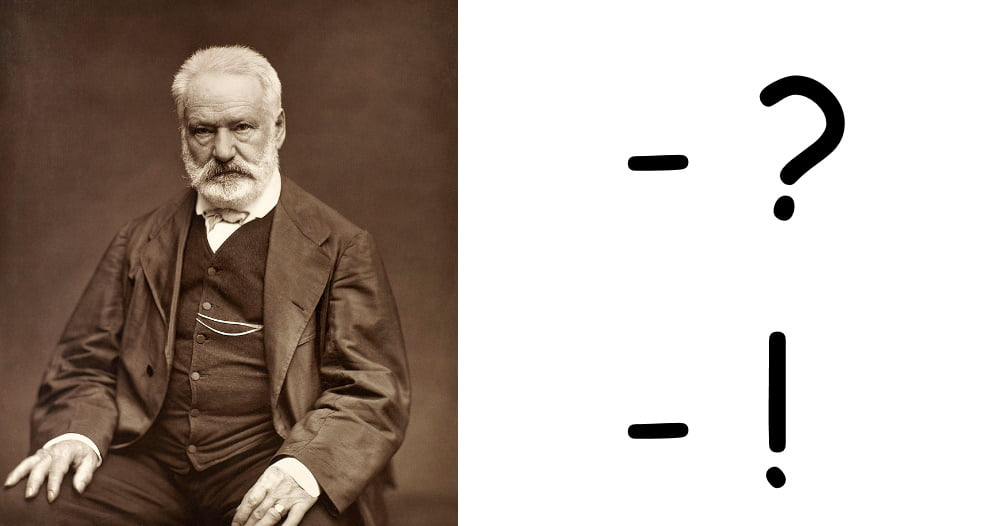Numerous sources claim that the famous French writer once sent a telegram (or letter) consisting of one question mark, and received a response consisting of one exclamation mark. We checked to see if this was the case.
A typical story looks like this: “Victor Hugo, while on vacation in 1862, wanted to know about the reaction of readers to the newly published novel Les Misérables and sent his publisher a telegram of one character “?”. He sent a telegram in response, also with one sign: “!”
The episode is described in many sources, including, for example, official communities “Russian Posts» and publishing housesEksmo", "Reader's Encyclopedia", Guinness Book of Records 1987 and "Museum of Facts" In some versions, the specific publisher of the novel, Hurst & Blackett, is also mentioned. And almost everywhere what happened was called “the shortest correspondence in history.”
Victor Hugo's novel Les Misérables was indeed first published in 1862 in French (by Lacroix, Verboeckhoven & Co. in Brussels and Paris) and later in English. Moreover, the Americans translated the novel in June, and only in October the turn has come to England - represented by the above-mentioned publishing house Hurst & Blackett.

However, the first messages on the topic of the shortest correspondence appeared a little earlier. Thus, in The Nottinghamshire Guardian newspaper of April 25, 1850 noted:
“The shortest known correspondence used only two digits. The first letter contained a question mark (?) meaning: "Any news?" The answer was zero (0), that is, “no.”
In this or a similar form, the entertaining story wandered from newspaper to newspaper across Britain and the USA, until in 1854 an alternative version appeared in one of the Portland newspapers:
“But the shortest known correspondence took place between an American merchant thirsty for news and his London agent. The letter read: "!", and the answer was "0". That was the shortest hint possible that nothing had happened.”
And finally, in 1892, the curiosity was first retold with reference to a French writer. It happened in Directory of Literary Curiosities, published in the USA, edited by William S. Walsh:
“But the shortest known correspondence took place between Victor Hugo and his publisher immediately after the publication of Les Misérables. The poet, impatiently awaiting news of the success of his book, sent a letter that contained only this: "?" And he received the following satisfying answer: “!”
Walsh's reference book was quite popular in its time and was reprinted many times, so the story about Victor Hugo and his publisher was simply bound to spread across various English-language publications. collections of interesting facts. Until, finally, in the early 1970s, she got into the most famous publication of this kind - Guinness Book of Records. Considering the authority of the latter, for history this was already a ticket to all countries and all languages.
And yet, in French, such information is extremely unpopular and is almost never found in accessible printed publications. Rare exception - little-known linguistic manual 1980, where the similarity of the narrative with the English version is striking. Most likely, there was a translation from English. Needless to say, there is nothing similar in Hugo’s letters that have reached us (telegrams in 1861 were not widespread at all). Except one letters, in which the writer confesses to his friend Louis Boulanger that he “devotes his mind to the contemplation of the world and spends his life between exclamation and question marks,” which is clearly not the case here.
In summary: the story of Hugo first appeared in print very late (more than 30 years after the publication of the novel “Les Miserables”), and in the USA, it is very similar to the anecdotes of previous decades and is not confirmed in the homeland and by the writer’s biographers. Therefore, with a high degree of probability it can be argued that the correspondence between the author of Les Misérables and his publisher is fictitious.
Not true
Read on topic:
1. Briefest Correspondence: Question Mark? Exclamation Mark!
If you find a spelling or grammatical error, please let us know by highlighting the error text and clicking Ctrl+Enter.







